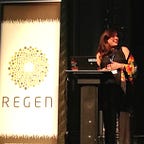The Ultimate Investment: Biodiversity — The Impact Imperative
“Human life on this planet is no longer a certainty, but a possibility” — says Yayo Herrero.
There is no investing possibility in a world where humans are extinct. Should human life be an optional investment, a charity case, or an impact imperative?
Biodiversity — as the only system that provides life — is everyone’s only life insurance. Natural capital is the infrastructure we need to address the climate crisis. And the new goal is not carbon neutrality or NetZero, but rather Nature Positive.
Why is Biodiversity the Ultimate Investment?
Well let’s start by the definition of ul·ti·mate /ˈəltəmət/ adjective
- being or happening at the end of a process; final.
- the best achievable or imaginable of its kind.
- a final or fundamental fact or principle.
Without a doubt mitigating and regulating carbon emissions are crucial factors for life, that we are currently learning to measure, account for, and pay for. But carbon emissions are not the only factor in the whole climate story. The bigger picture of what supports our life on this planet really is biodiversity.
We have to allow ourselves to evolve beyond the monochromatic view that reduces all climate outcomes to one variable of carbon emissions and start embracing all the full colors and complexity of natural capital and all of its cycles. We owe our existence to much more than temperature and I worry that we may decarbonize our way at the cost of biodiversity like with commercial forestry non-native monoculture plantations that sell carbon credits for example. We should not only avoid excess emissions but also ecosystem degradation.
When banks, investment firms and finance understand that biodiversity is not a charity case, but our life line then maybe we will all start paying our ecological debt.
It never ceases to amaze me that humans, the only “intelligent” species on the planet, under a capitalist economy need to establish a business case for saving our lives. The rest of the species just do it intuitively.
The good news is that mainstream capital markets are already transforming. In the past couple of years we have been breaking all records of massive amounts of capital now flowing into investments with environmental and social considerations. But maybe we need to do much more than just “considering” the environment. The challenge now is that to unleash impact investments full potential we have to go way deeper into questioning the power dynamics and dismantle the status quo of the most entrenched paradigms of investment.
We have confused investment with speculation, I even dare to say with gambling; we have confused value with price; we have confused exponential growth with wellbeing; and the speed of returns has become a drug for decision making behavior.
Let’s reflect on the fact that the current financial system and its underlying beliefs is generating inequality, social injustice and environmental destruction. What am I investing in? What structures of power dynamics am I continuing? Is there a way for investment to be distributive by design instead of accumulative by design? As Jed Emerson questions: Is the purpose of capital it’s eternal reproduction or is it freedom, balance and wellbeing for all? Am I investing in service of life, living systems, biodiversity? Or exploiting them?
If investing is a social construct, we can surely reinvent it, reimagine it. Instead of investing to control more, let’s invest to liberate more; freedom is a prerequisite for justice and justice a prerequisite for peace and peace a prerequisite for thriving life. Let’s not use capital for control because that is a path to social injustice.
If we want to transform the results of investing, we must transform our own understanding and beliefs of capital flows and the economic system. We have a huge real debt to our planet and to repay it we must recognize where we have the most savings: wisdom stored for billions of years in ecosystems and indigenous communities: The best stewards for biodiversity; thus to decolonize finance is vital in order to repay our ecological debt.
The most biological wealth in the world is located in indigenous land and this is not by accident but by generations of wisdom. In order to protect biodiversity we need to decolonize financial systems and the economy, or re-indigenize them and shift paradigms of never ending extraction into limits to growth and ensuring all capital is working for regeneration.
In SVX Mexico we’ve been cultivating investments in service of life, seeking those that steward and nourish biodiversity in Mexico and Latin America and learning about regenerative processes along the way since 2016. We’ve found there is an enormous untapped potential in natural infrastructure, cooperatives, landscape approach, place-based, bioregional and watershed projects and other groundbreakingly beautiful investment opportunities that require a vision that is more willing and open minded than the current investment theses are.
People ask if they need to give up returns as a tradeoff for impact: I think we have never known real investment returns at all: The returns that await us are in an abundance way beyond what an excel spreadsheet or financial statement can hold; we can let go of the black and white financial return and open our eyes to the exuberant and wild beauty of collective abundance with all of its colors; but only if we learn from the most generous bank in the history of this planet: the soil! You deposit one seed and it gives you food, and clothing, and shadow. Soil is distributive and nurturing by design, so must our investment decisions be. When we make finance fall in love with life, our kids will inherit paradise and regeneration will be inevitable.
We are not here to make the world a bit better for some people, we are here to co-create the best version of the world for all!
